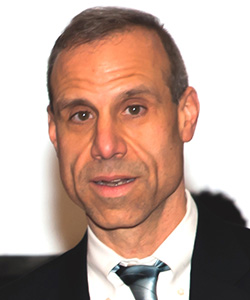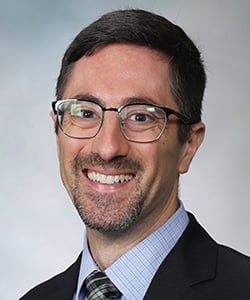
Register
Program
| 7:00 pm ET | Welcome and Introductions | Eric Schwenk, MD (moderator) |
| 7:05 pm ET | ASRA Ketamine Guidelines and Updates | Eric Schwenk, MD |
| 7:15 pm ET | Ketamine and Opioid-tolerant Patients | Steven Porter, MD |
| 7:25 pm ET | Where Do We Stand with Ketamine for Chronic Pain Conditions? | Steven Cohen, MD |
| 7:35 pm ET | How I Do It: Ketamine for CRPS | Lynn Kohan, MD |
| 7:45 pm ET | Q & A - Panel Discussion | |
| 8:00 pm ET | Adjournment |
Faculty
View all faculty disclosures.
Scientific/Education Planning Committee
Andrea Chadwick, MD; University of Kansas School of Medicine, Leawood, KS
Ki-Jinn Chin, MBBS, FANZC, FRCPC; Toronto Western Hospital, Toronto, Ontario
Eric Schwenk, MD; Sidney Kimmel Medical College at Thomas Jefferson University, Philadelphia, PA

Steven P. Cohen, MD, obtained his medical degree at Mount Sinai, completed an anesthesiology residency at Columbia University, and a pain fellowship at Massachusetts General Hospital. He is professor of anesthesiology & critical care medicine, neurology and physical medicine & rehabilitation at the Johns Hopkins School of Medicine and Uniformed Services University of the Health Sciences. He is also Chief of Pain Medicine and Director of the Blaustein Pain Treatment Center at Johns Hopkins and a retired army colonel.

Lynn Kohan, MD, is an associate professor of anesthesiology and pain medicine at the University of Virginia. She obtained her medical degree from Georgetown University, where she also completed her anesthesia residency. She completed her pain medicine fellowship at the University of Virginia and stayed on as faculty. She currently serves as the Pain Management Fellowship Director. Her research and clinical interests include head and facial pain, novel RF techniques, medical and interventional treatments for acute and chronic pain, and resident/fellow education.

Steven Porter, MD, is assistant professor of anesthesiology in the department of anesthesiology and perioperative medicine at Mayo Clinic in Jacksonville, FL. He is the program director for Mayo Clinic Florida’s RAAPM fellowship, the medical director for Mayo Clinic Florida’s Quality Academy, and the chair of his hospital’s controlled substance and pain oversight team. Dr. Porter has lectured at regional, national, and international meetings on topics related to regional anesthesia and acute pain management.

Eric Schwenk, MD, is a fellowship-trained regional anesthesiologist and acute pain physician at Jefferson in Philadelphia, PA. Dr. Schwenk is a member of the research committee and guidelines/regulatory advocacy committee in ASRA. His academic interests are ketamine for refractory headache, perioperative ketamine and adverse effects, perioperative management of total joint arthroplasty, and social media in medicine.
CME-CPD
To receive your CME certificate
- Download the Credit Claim Form.
- Indicate the number of hours you attended (credit will be verified against registration).
- Send the completed form to [email protected].
- Your certificate will be emailed to you within 1 week.
Educational objectives
After participating in this educational activity, participants should be able to:
- Identify at least 2 groups of patients in whom ketamine might be appropriate.
- Describe appropriate monitoring and possible adverse effects of ketamine.
- Describe at least one way to make ketamine administration simpler in your practice.
Target audience
This webinar is designed for the physicians who wish to better understand ketamine as an analgesic and appropriate times to consider its use.
Accreditation and credit designation statements
| Credits by Day | Maximum |
| December 15, 2021 | 1.00 |
| Total Credits | 1.00 |
Physicians
The American Society of Regional Anesthesia and Pain Medicine is accredited by the Accreditation Council for Continuing Medical Education (ACCME) to provide continuing medical education for physicians.
The American Society of Regional Anesthesia and Pain Medicine designates this internet live activity (“course”) for a maximum of 1.00 AMA PRA Category 1 Credits™. Physicians should claim only the credit commensurate with the extent of their participation in the activity.
PAs (Physicians Assistants)
AAPA accepts certificates of participation for educational activities certified for AMA PRA Category 1 Credit™ from organizations accredited by ACCME or a recognized state medical society.
Physician assistants may receive a maximum of 1.00 hours of Category 1 credit for completing this program.
Nurse Practitioners
The American Association of Nurse Practitioners (AANP) accepts AMA PRA Category 1 Credits™ from organizations accredited by the ACCME. This activity has been approved for a maximum of 1.00 AMA PRA Category 1 Credits™.
Registered Nurses
Regulations dictate that only physicians may earn CME credits, however, many state Boards of Registered Nursing accept AMA PRA Category 1 Credits™ from organizations accredited by the ACCME. Attendees
are responsible for confirming their specific board’s acceptance of ASRA-provided credits. This activity has been approved for a maximum of 1.00 AMA PRA Category 1 Credits™.
The American Board of Anesthesiology® MOCA®
This activity contributes to the CME requirements for Part II: Lifelong Learning and Self-Assessment of the American Board of Anesthesiology’s (ABA) redesigned Maintenance of Certification in Anesthesiology Program® (MOCA®), known as MOCA
2.0™. Please consult the ABA website, www.theABA.org, for a list of all MOCA 2.0 requirements. Maintenance of Certification in Anesthesiology
Program® and MOCA® are registered certification marks of The American Board of Anesthesiology®.
ASRA is an ABA-approved provider and, as a service to ASRA members and participants, CME credits are reported to the ABA. Participants must include their correctly formatted ABA ID number (34567890) during the online evaluation and credit claim process
available at the conclusion of the activity. Once the online evaluation and credit claim process is closed, certificates will be issued and credits reported to the ABA. After this time, participants may request their CME certificate by contacting
[email protected], but ASRA will no longer report credits to the ABA, which will then be the individual participant’s responsibility.
International credits
Royal College of Physicians and Surgeons of Canada
The Royal College of Physicians and Surgeons of Canada has agreements based on the mutual recognition of credit points with the American Medical Association for live and web-based
(synchronous or asynchronous) educational events. You may submit your CME certificate directly for credit recognition of this accredited group learning activity (Section 1) as defined by the Maintenance of Certification program of The Royal
College of Physicians and Surgeons of Canada. For more information, visit: www.royalcollege.ca
European Accreditation Council for Continuing Medical Education (UEMS-EACCME)
The UEMS-EACCME has agreements based on the mutual recognition of credit points with the American Medical Association for live and e-learning educational
events. Each medical specialist should claim only those hours of credit that he/she actually spent in the educational activity. The EACCME is an institution of the European Union of Medical Specialists (UEMS): www.uems.net
Commercial support disclosure
No industry support has been received for this educational activity.
Disclosure and resolution of personal conflicts of interest
Click here to view all faculty disclosures. In accordance with the ACCME’s Standards for Integrity and Independence and related policies, ASRA is committed to ensuring balance, independence, objectivity, and scientific rigor in its CME/CPD activities. Those in control of the educational content disclose all relevant relationships (financial or other) with any ineligible company that they have had within the past 24 months. If an individual refuses to disclose, they are disqualified from participating. Disclosure information is evaluated and conflicts of interest resolved. Disclosure is made to participants prior to the activity. Participants are asked to evaluate the objectivity and independence. Off-label or investigational use of a therapeutic product is also disclosed.
Check Out These Upcoming Programs
-
Apr16
-
Mar21